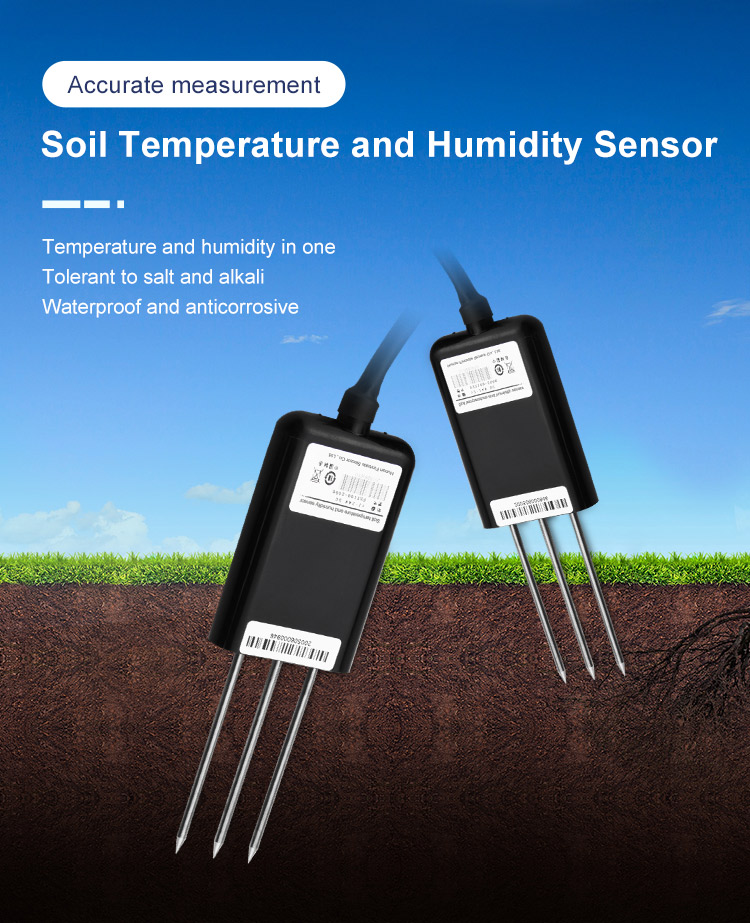
News Center
Soil Moisture Sensors In Agriculture
- Categories:News Center
- Time of issue:2023-07-13 10:46
(Summary description)In agriculture, soil moisture sensors are used as follows: Modern agriculture relies on soil moisture sensors to provide farmers with valuable data and help them make informed irrigation, water use, and crop management decisions. Here, we will explore how soil moisture sensors are changing the way farmers cultivate their lands and how they are revolutionizing agriculture. 1. Enhancing Water Efficiency: With the increasing demand for water and the need to conserve this precious resource, soil moisture sensors prove to be invaluable tools for farmers. By accurately measuring soil moisture levels, these sensors enable farmers to optimize irrigation practices, ensuring that crops receive just the right amount of water they need. This not only minimizes water wastage but also reduces the risk of overwatering, which can lead to root rot and other plant diseases. 2. Improving Crop Yield and Quality: Maintaining an optimal balance of soil moisture is vital for crop growth and development. Soil moisture sensors provide real-time data on soil moisture content, allowing farmers to identify areas of their fields that require additional irrigation or drainage. By addressing these specific needs, farmers can ensure that their crops receive the ideal moisture levels, resulting in improved yield and quality. 3. Preventing Soil Erosion: Soil erosion is a major concern in agriculture, leading to loss of topsoil and reduced fertility. Soil moisture sensors help farmers monitor soil moisture levels and prevent excessive runoff by adjusting irrigation practices accordingly. By keeping the soil adequately moist, farmers can minimize erosion and protect their land for long-term productivity. 4. Saving Time and Effort: Traditionally, farmers relied on visual inspection or manual soil sampling to determine soil moisture levels. This process was time-consuming and often resulted in inaccurate readings. Soil moisture sensors eliminate this guesswork, providing instant and accurate data on moisture content. This saves farmers valuable time and effort, enabling them to focus on other critical aspects of their farm operations. Firstrate Soil Sensor ● Small size design, easy to carry, simple installation, operation and maintenance ● Good airtightness, can be buried in different depths of soil for a long time ● High measurement accuracy and reliable performance ● Fast response speed and high data transmission efficiency 【Scope of application】 ● Water-saving agricultural irrigation, weather monitoring ● Greenhouses, flowers and vegetables, grass pastures, soil testing ● Fields that need to measure soil moisture, such as plant cultivation and scientific experiments If you're looking for a Soil Sensor in agriculture,Please Contact usGet A Quote
Soil Moisture Sensors In Agriculture
(Summary description)In agriculture, soil moisture sensors are used as follows:
Modern agriculture relies on soil moisture sensors to provide farmers with valuable data and help them make informed irrigation, water use, and crop management decisions.
Here, we will explore how soil moisture sensors are changing the way farmers cultivate their lands and how they are revolutionizing agriculture.
1. Enhancing Water Efficiency:
With the increasing demand for water and the need to conserve this precious resource, soil moisture sensors prove to be invaluable tools for farmers. By accurately measuring soil moisture levels, these sensors enable farmers to optimize irrigation practices, ensuring that crops receive just the right amount of water they need. This not only minimizes water wastage but also reduces the risk of overwatering, which can lead to root rot and other plant diseases.
2. Improving Crop Yield and Quality:
Maintaining an optimal balance of soil moisture is vital for crop growth and development. Soil moisture sensors provide real-time data on soil moisture content, allowing farmers to identify areas of their fields that require additional irrigation or drainage. By addressing these specific needs, farmers can ensure that their crops receive the ideal moisture levels, resulting in improved yield and quality.
3. Preventing Soil Erosion:
Soil erosion is a major concern in agriculture, leading to loss of topsoil and reduced fertility. Soil moisture sensors help farmers monitor soil moisture levels and prevent excessive runoff by adjusting irrigation practices accordingly. By keeping the soil adequately moist, farmers can minimize erosion and protect their land for long-term productivity.
4. Saving Time and Effort:
Traditionally, farmers relied on visual inspection or manual soil sampling to determine soil moisture levels. This process was time-consuming and often resulted in inaccurate readings. Soil moisture sensors eliminate this guesswork, providing instant and accurate data on moisture content. This saves farmers valuable time and effort, enabling them to focus on other critical aspects of their farm operations.
Firstrate Soil Sensor
● Small size design, easy to carry, simple installation, operation and maintenance
● Good airtightness, can be buried in different depths of soil for a long time
● High measurement accuracy and reliable performance
● Fast response speed and high data transmission efficiency
【Scope of application】
● Water-saving agricultural irrigation, weather monitoring
● Greenhouses, flowers and vegetables, grass pastures, soil testing
● Fields that need to measure soil moisture, such as plant cultivation and scientific experiments
If you're looking for a Soil Sensor in agriculture,Please Contact usGet A Quote
- Categories:News Center
- Time of issue:2023-07-13 10:46
In agriculture, soil moisture sensors are used as follows:
Modern agriculture relies on soil moisture sensors to provide farmers with valuable data and help them make informed irrigation, water use, and crop management decisions.
Here, we will explore how soil moisture sensors are changing the way farmers cultivate their lands and how they are revolutionizing agriculture.

1. Enhancing Water Efficiency:
With the increasing demand for water and the need to conserve this precious resource, soil moisture sensors prove to be invaluable tools for farmers. By accurately measuring soil moisture levels, these sensors enable farmers to optimize irrigation practices, ensuring that crops receive just the right amount of water they need. This not only minimizes water wastage but also reduces the risk of overwatering, which can lead to root rot and other plant diseases.
2. Improving Crop Yield and Quality:
Maintaining an optimal balance of soil moisture is vital for crop growth and development. Soil moisture sensors provide real-time data on soil moisture content, allowing farmers to identify areas of their fields that require additional irrigation or drainage. By addressing these specific needs, farmers can ensure that their crops receive the ideal moisture levels, resulting in improved yield and quality.
3. Preventing Soil Erosion:
Soil erosion is a major concern in agriculture, leading to loss of topsoil and reduced fertility. Soil moisture sensors help farmers monitor soil moisture levels and prevent excessive runoff by adjusting irrigation practices accordingly. By keeping the soil adequately moist, farmers can minimize erosion and protect their land for long-term productivity.
4. Saving Time and Effort:
Traditionally, farmers relied on visual inspection or manual soil sampling to determine soil moisture levels. This process was time-consuming and often resulted in inaccurate readings. Soil moisture sensors eliminate this guesswork, providing instant and accurate data on moisture content. This saves farmers valuable time and effort, enabling them to focus on other critical aspects of their farm operations.
Firstrate Soil Sensor
● Small size design, easy to carry, simple installation, operation and maintenance
● Good airtightness, can be buried in different depths of soil for a long time
● High measurement accuracy and reliable performance
● Fast response speed and high data transmission efficiency
【Scope of application】
● Water-saving agricultural irrigation, weather monitoring
● Greenhouses, flowers and vegetables, grass pastures, soil testing
● Fields that need to measure soil moisture, such as plant cultivation and scientific experiments
If you're looking for a Soil Sensor in agriculture,Please Contact usGet A Quote
Top Ranking
RECOMMEND NEWS
Top Ranking
RECOMMEND NEWS
ONLINE MESSAGE
WRITE A MESSAGE TO US
v
Contact us
Tel:
+86 731-86171990
Email:
sales@firstratesensor.com
Address: 4th Floor, Building 1, Zhitingyuan, Zhenhua Road, Yuhua District, Changsha City, Hunan Province,China.







